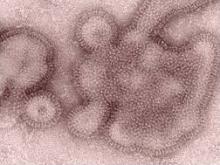There has been a "significant increase" in the number of detected human infections involving the H3N2 variant virus, according to the Centers for Disease Control and Prevention. A total of 16 cases – out of 29 overall – have been reported in the last 3 weeks.
All 12 of the most recently reported cases occurred in people who had direct or indirect contact with swine prior to their illness, the CDC reported on Aug. 3. They occurred in Hawaii, Ohio, and Indiana.
All 29 cases identified since July 2011 are due to an H3N2 variant, or H3N2v, virus that contains the M gene from the human influenza A(H1N1)pdm09 (2009 H1N1) virus. "This M gene may confer increased transmissibility to and among humans compared with other variant influenza viruses," Dr. Joseph Bresse, a medical epidemiologist with the CDC’s influenza division, said during a telephone press conference sponsored by the CDC. Among this overall total, 1 was detected in Hawaii, 7 in Indiana, 3 in Iowa, 10 in Ohio, 2 in Maine, 3 in Pennsylvania, 1 in Utah and 2 in West Virginia.
Overall, 23 cases involved swine contact prior to illness onset and 19 cases were associated with state agricultural fairs, where swine were present.
Signs and symptoms of H3N2v virus infection are similar to those caused by other respiratory infections, including seasonal influenza virus infection. If H3N2v virus infection is suspected because of recent exposure to pigs, testing of respiratory specimens should be performed at a state health department; rapid influenza diagnostic tests may not detect H3N2v virus in human respiratory specimens, resulting in false negative results.
Two antivirals – oseltamivir (Tamiflu) and zanamivir (Relenza) – have been approved by the Food and Drug Administration for the treatment of illness associated with H3N2v virus infection. Antiviral treatment is most effective when started as soon as possible after illness onset, according to the CDC.
There has been no human-to-human transmission among the 12 recent cases, according to Dr. Bresse. However, three cases since July 2011 have been due to human-to-human transmission. Likewise, no deaths or hospitalizations have been associated with the most recent cases, though there have been three hospitalizations overall required for individuals with underlying diseases that put them at higher risk from the infection.
Thirteen of the infections occurred in children, which is consistent with research studies demonstrating that children may be more susceptible to the infection than adults.
Dr. Bresse noted that influenza viruses have not been shown to be transmissible to people through eating properly handled and prepared pork (pig meat) or other products derived from pigs.
The CDC has developed a variant vaccine candidate that will be undergoing clinical trials later this year.
For information on the prevention of infection with the H3N2v virus, see the CDC’s fact sheet. For information on the proper handling of livestock, see the Animal Contact Compendium published by the National Association of State Public Health Veterinarians.


